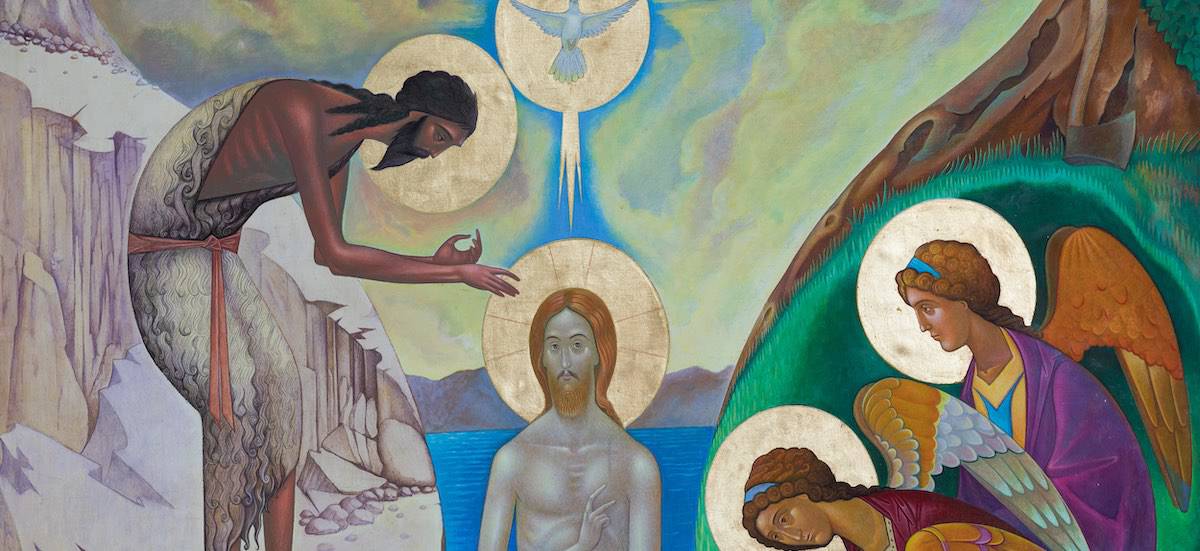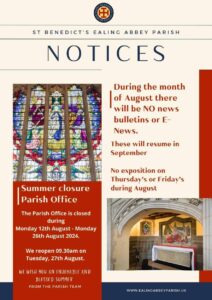Dear Parishioner,
If you have been able to visit the abbey church recently you may well have seen the striking and unusual figures made for the Christmas crib by Stephen Nemethy, a young man who used to have a workshop at the abbey and made several art works still on display. The splendid painting of the baptism of Christ on the wall by the font is by him. It has the stylised appearance of icons, but with an attractive brightly colourful, almost childlike quality which is typical of Stephen’s work.
I once had the opportunity to ask him to do a painting for a prayer room that I was setting up at Westminster Cathedral. By that time Stephen had moved away from London and gone to live in Walsingham, where I went to see him to receive the finished work. He had chosen as a subject the two disciples on the road to Emmaus meeting the risen Christ on the evening of the first Easter Day. In fact he made three different versions of the scene, the last one, which he wanted us to display, showing the disciples crossing a bridge from Jerusalem with its hills on the left to the little village of Emmaus on the right, Jesus going before, leading them over. The stones of which the bridge is composed look like broken pieces of the bread of the Eucharist, the body of Christ which feeds as we journey through life, one of the disciples is a self-portrait and the two are dragging after them a strange device resembling a large skull – not an immediately appealing image. In the top half of the picture Stephen painted small scenes of some of the great prophets – Isaiah, Jonah and his whale (he always liked watery subjects and sea creatures and shows Jonah in the river Jordan at Christ’s baptism), John the Baptist.
I did not know much about Stephen and his life until that meeting at Walsingham, when he told me that in earlier days he had had a time of drifting, trying to find himself, until he was helped by Fr. Michael Hopley, much loved monk of the abbey, to reconnect with his faith. He had always been a gifted graphic designer, but now his art took on a new direction and in not many years he produced a large amount of original work – paintings, wood carvings, sculptures, frescoes, banners.
Stephen had to struggle for most of his life with ill-health and sadly died at the early age of forty. 2024 will be the twentieth anniversary of his death: I am hoping to arrange an exhibition then in his memory. The skull-device in the painting seems like a symbol for the darker aspects of life, such as poor health, which we carry with us as we seek to follow the way of the risen Lord. It can never be God’s will that we suffer, but suffering of various kinds is likely to be an element in most people’s lives in this kind of world. The many stories of healing in the Gospels show that God is always wanting to lead us through illness, hardships, difficulties so that we can live anew and come at last to share the glorious resurrection of his Son – that journey which begins for us when we are baptised.
When conducting baptisms at the abbey I sometimes drew people’s attention to Stephen’s painting and referred to his life. We do not know what a baby being baptised is going to grow into. We may have various dreams and hopes for him or her, which may or not be fulfilled. Any life may develop in various unexpected ways. What we can be sure of, however, is that the baptised have the gift of God’s Spirit within them who will always be present whatever happens to them. The events of our lives may cause us to lose sight of God, but God never loses sight of us and is ever ready to share his love and life with us.
In the top right-hand corner of Stephen’s picture he painted an axe against the rocks. I asked him once why it was there, and he said it referred to a verse in St. Matthew’s Gospel about the ministry of John the Baptist, where he denounces those who put their faith in their ancestry, their descent from Abraham. ‘Even now,’ he says, ‘the axe is lying at the root of the trees; every tree therefore that does not bear good fruit is cut down and thrown into the fire.’ The coming of God into our world brings judgment as well as comfort. It presents us with the challenge of how we are going to live as the new humanity. Especially in this year of grace 2021, when we still face the huge problem of the pandemic, though with signs of hope that it can be overcome, how we will continue to be God’s people and place our trust in him is an open question to address, both for our own sake and for the sake of the world and people in general. But as we do so we can certainly take heart from our belief in Emmanuel, God-with-us.
In the second reading of this Sunday’s Mass Saint Paul speaks of preaching the Gospel as a duty laid upon him which he has not chosen himself, and his reward as the opportunity to offer the Good News free. All of us who are the Church today have the vocation to proclaim the Good News, both by what we say and more importantly by who we are, by how we life our lives in union with God, out of the Spirit given to us who dwells within at the centre of our being. If we are to do this, then like Christ, who so often went off to a lonely place to pray, we need our times of withdrawal, of quiet and stillness to be with God and listen to him; then our work, our activity in the service of God will be the more effective and fruitful since it will be properly focused and centred.
The Church in recent times seems to have been rather more activist than contemplative, and the balance is in many places being restored, but It is not matter of choosing to be either active or contemplative – we need both. The American Franciscan Richard Rohr runs what he calls a Centre for Action and Contemplation in New Mexico. I heard him say that when asked which is the most important word in that title, his reply is, ‘The most important word in our title is the word AND!’



